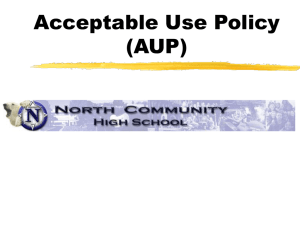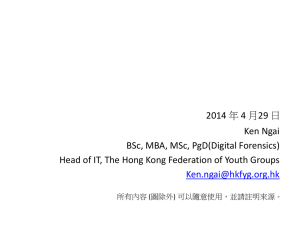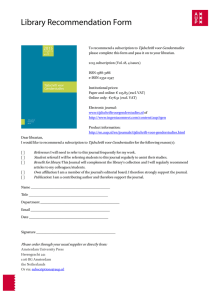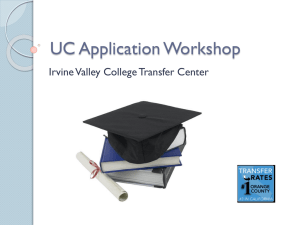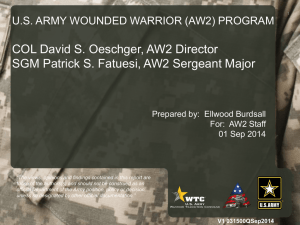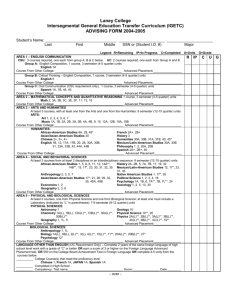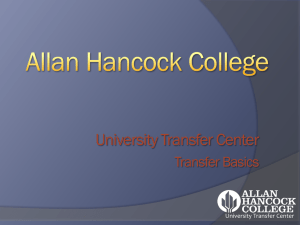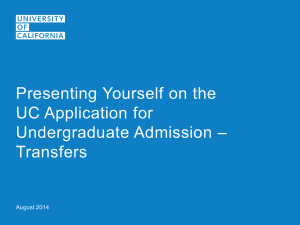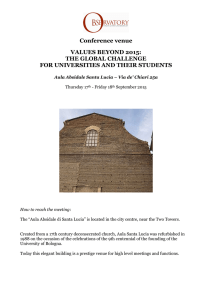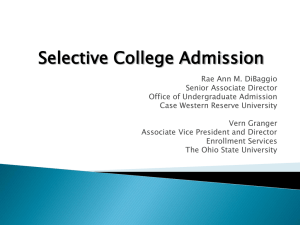International Articulation Agreements: Challenges and Benefits
advertisement
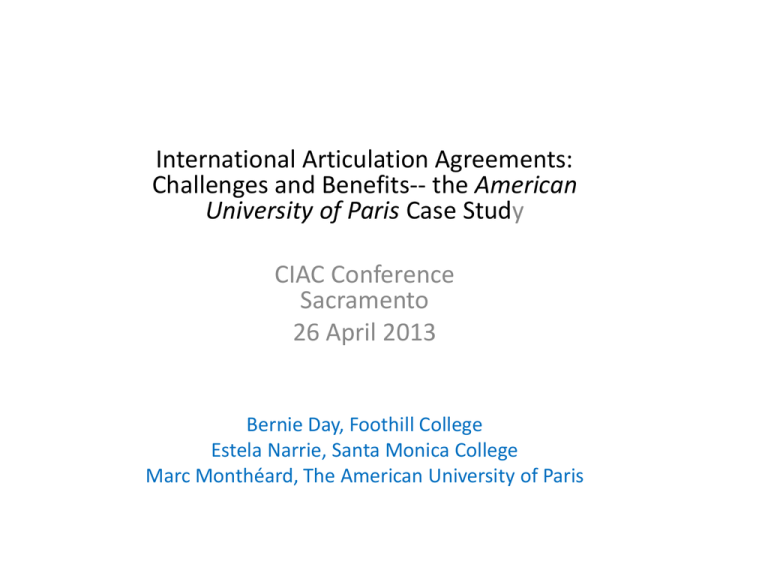
International Articulation Agreements: Challenges and Benefits-- the American University of Paris Case Study CIAC Conference Sacramento 26 April 2013 Bernie Day, Foothill College Estela Narrie, Santa Monica College Marc Monthéard, The American University of Paris AUP Profile US institution created in 1962, located exclusively in Paris From a two-year (associate degree) college for sons and daughters of Europe-based US troops to a full-fledge university (14 BA & BS degrees and 9 MA programs) with 100 nationalities Accredited since 1973, certifying US $5.5 million in federal loans AUP Profile 1,000 students, 120 faculty and 90 staff members and administration American model vs. European style of education (student support, student life, …) 85% are degree-seeking students vs. 15% study abroad 80% freshman vs. 20% transfer students (undergrad. degree-seeking incoming class) AUP Profile Transfer students: an interesting market for four-yr. institutions which allows us to compensate for natural attrition Community Colleges: an ideal market Mutual interest Less risky choice than freshman students (selectivity on college-level performance) AUP Strategy Compensate our financial disadvantage (expensive tuition and cost of living: 25,000€ + 15,000€/yr.) by our natural advantages (Paris, a TRUE international experience) and by working AHEAD of time to ensure the smoothest possible transfer procedure Where to Start? Understanding regional specificities IGETC Problems with local transfers to state institutions Review our past transfer procedures and identify problems faced by transfer students at AUP Convince our faculty that this was a good idea, worth their time Challenges Fight pre-conceived ideas among our faculty Transfer guarantee = losing our ability to screen admitted students Community colleges are not as good (reputable) as four-year colleges Mostly professionally oriented students with remedial level in traditional academic fields More Challenges General Education: THE BIG PILL TO SWALLOW Can anyone teach English Composition as well as we do?????? These bodies will never fill up OUR intro courses (we will not have the opportunity to win them over to OUR major) Their Elementary Statistics is not EXACTLY the same as our Applied Statistics I!! And…More Challenges Two-year learning process for me both in California and at home Risk of losing people’s attention Never a top priority for overworked faculty Convince Community College partners (just as overworked as my colleagues back home!) that it is worth it … and that this is not going to generate a huge amount of work for them The perks of starting with California Our #1 recrutement state in the US A well-structured General Education program UC : a reassuring alibi A difficult local transfer situation Patient partners who turned out to be very generous with their time and advice Our Plan of Action Offer a guaranteed transfer agreement with set criteria Establish for each institution an extensive list of major prep courses with automatic equivalencies Offer a student with 64 transferable credits, the guarantee to FINISH in four straight semesters under certain conditions What Does It Take? A lot of work for the four-year institution A good working relationship with Departmental Chairs, Curriculum Committee, General Education Committee, Academic Affairs Patience and perseverance Patience and perseverance…. And more patience and perseverance! SMC-AUP Agreement (1) The articulation agreement creates a transfer program between Santa Monica College (SMC) and The American University of Paris (AUP). This agreement is designed for degree-seeking students enrolled at SMC interested in transferring to the following programs at AUP: - Art History - Computer Science (ICT Track) - Film Studies - History - IICP - International Finance - AH w/ Visual Culture Track - Entrepreneurship - Global Communication - IB Administration - International Economics - Psychology SMC students will be granted guaranteed transfer admission provided that the following requirements are met: SMC-AUP Agreement (2) The student has received IGETC certification by the time s/he transfers to AUP. The student has acquired a minimum of 45 UC/CSU transferable semester credits at SMC by the time s/he transfers to AUP. Her/his cumulative UC/CSU transferable Grade Point Average is equal or superior to 3.0(“B”). The student is in good disciplinary standing at SMC. … The AUP General Education requirements (with the exception of the French requirement that will be evaluated will be considered as fulfilled so long as the student will have received IGETC certification and will have completed English Communication 1B with a minimum grade of “B”. by a test administered upon arrival on campus) Please note that courses used to fulfill the IGETC certification cannot be validated as a major preparatory course. SMC-AUP Agreement (3) SMC students who will qualify for the guaranteed transfer admission and who will transfer 64 credits to AUP will have the guarantee to be able to complete a Bachelor’s Degree within four semesters provided that, prior to their transfer, they have successfully completed the minimum required major preparatory courses as stated below: Art History (4), Art History with a Visual Track (4) Entrepreneurship (3), Film Studies (4 ), Global Communication (4 ), Information and Communication Technologies(4) (International Business Administration (6 ), International and Comparative Politics (4 ), International Economics (3 ) International Finance (4), Psychology (4). … As a Title IV approved school, AUP administers and processes US federal loans through the Direct Loan Program. American students at AUP have the option of applying for federal Stafford and Parent PLUS loans based on standard application requirements for these programs. SMC-AUP Agreement (4) American students also have the option of applying for the Sallie Mae Smart Option private loan to bridge a gap in funding or to substitute for federal loan money. AUP also awards tuition grants to transfer students based on a combination of financial need (as determined by the FAFSA and AUP’s own financial aid application) and academic strength (based on the application for admission). Awards can range to as much as 30% or possibly even 50% of tuition. In exceptional cases, transfer students may be eligible for AUP Scholar Awards, carrying a 75% tuition abatement. … Example of a Major Prep List FOOTHILL AUP INTERNATIONAL BUSINESS ADMINISTRATION ACTG 1A-B* FINANCIAL ACCOUNTING I &II BA 2001 BUSI 22* PRINCIPLES OF BUSINESS BA 2020 OR BUSI 90A* PRINCIPLES OF MANAGEMENT BA 2020 MATH 10* ELEMENTARY STATISTICS MA1020 and up TO 4 courses among the following: BUSI 53 SURVEY OF INTERNATIONAL BUSINESS BA 4000 BUSI 57 PRINCIPLES OF ADVERTIZING BA 3036 BUSI 58 SURVEY OF INTERNATIONAL MARKETING BA 3045 BUSI 59 PRINCIPLES OF MARKETING BA 2040 ACTG 1C MANAGERIAL ACCOUNTING BA 2002 BUSI 18 BUSINESS LAW I BA 3075 OR BUSI 19 BUSINESS LAW II BA 3075 ECON 1 PRINCIPLES OF MICROECONOMICS EC 2010 ECON 2 PRINCIPLES OF MACROECONOMICS EC 2020 * = required course for the garantee to be able to finish in 4 semesters Application Process SMC STUDENTS RETENTION AT AUP 2003 to 2010 enrolled 22 graduated 18* 82% stayed 1 sem 3 13,5% stayed 2 sem 1 4,5% * 1 continued on to receive a MA degree Fall 2013 Admissions (Santa Monica College and Foothill College) Fall 2013 Santa Monica College Sophia Accepted Fall 2013 Santa Monica College Justice Accepted Fall 2013 Santa Monica College Elizabeth Application in Progress Fall 2013 Santa Monica College Kathleen Deferred to Spring 2014 Fall 2013 Foothill College Hilary Confirmed Transfer Pathway for CCC Students A CCC student will expect to be able to complete their degree in two years at your institution. Completion of the courses makes a student eligible for admission and may or may not constitute a guarantee of admission. However, coupled with completion of coursework, knowledge of a GPA range of consideration helps motivate students to apply for admission. In California, there is the Intersegmental General Education Transfer Curriculum (IGETC). This general education (GE) pattern is accepted by all California public universities to satisfy lower division general education requirements. In addition, many private, out-of-state and international schools also accept IGETC to fulfill GE requirements. Transfer Pathway for CCC Students Our IGETC pattern can be found at the following link: http://www.smc.edu/projects/26/igetc.pdf It would be helpful to our students if you would consider accepting the IGETC to fulfill your lower division GE requirements. Our students often are uncertain where they want to transfer and follow the IGETC to keep their options open. The following link will take you to the IGETC Standards, which details the purpose of IGETC, how courses are approved for IGETC and course guidelines. http://icas-ca.org/Websites/icasca/images/IGETC_Standards_Final_version_1.4.pdf The Web Sites http://www.smc.edu/projects/26/International_Schools/john_cabot_university_ rome_italy.pdf ; http://www.smc.edu/StudentServices/TransferServices/AreasofStudy/Document s/International_Schools/american_university_of_paris.pdf; http://www.smc.edu/StudentServices/TransferServices/AreasofStudy/Document s/International_Schools/city_university_london.pdf give examples of articulation agreements that reflects general education distribution requirements (based on IGETC) and major requirements that can be completed at Santa Monica College prior to transfer. This would be a recommended model to create with your institution. Your faculty can see all SMC course offerings at the online catalog: http://www2.smc.edu/catalog/2012-2013/12-13_catalog_part_3.pdf . If more detail is required, you can find course outlines of record at http://www.curricunet.com/SantaMonica/. No password is needed. Simply click on “courses” on the left side and search by discipline. Articulation Agreements SMC maintains numerous major articulation agreements with public universities in the state of California, like UC Berkeley and UCLA. These major articulation agreements prepare the students to enter these universities at the junior (third) year with knowledge equivalent to students that started the university at the freshman (first) year. To view these agreements, check: http://www.assist.org/web-assist/SMCC.html Other helpful information to include in an agreement is: Minimum GPA required for admission or admission consideration. Specific number of minimum units required for admission and maximum number of units accepted in transfer (if different). Application timeline Other Considerations Non-“American system” colleges and universities •Time to degree •Transferability of credit •Academic and student development support •Assessing curriculum quality Additional “American” Educational Opportunities Abroad Institutions Literature Additional resources Comments or Questions? Contact Us! NARRIE_ESTELA@smc.edu daybernie@fhda.edu mmontheard@aup.edu
